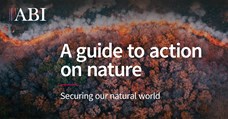 Nature has had a big place in our hearts for many years – just look at the millions of members of organizations such as the RSPB and the National Trust. The importance of nature was re-emphasised during the pandemic, with around half of us spending more time outdoors than before, and much research around the positive impact on our wellbeing of time in nature.
Nature has had a big place in our hearts for many years – just look at the millions of members of organizations such as the RSPB and the National Trust. The importance of nature was re-emphasised during the pandemic, with around half of us spending more time outdoors than before, and much research around the positive impact on our wellbeing of time in nature.
And yet the way we live puts a huge strain on nature. The evidence for this is clearer and clearer – in the air, in our rivers, in the hills and the lowlands, in towns, cities and farmland.
As David Attenborough put it:
We are facing a global crisis. We are totally dependent upon the natural world. It supplies us with every oxygen-laden breath we take and every mouthful of food we eat. But we are currently damaging it so profoundly that many of its natural systems are now on the verge of breakdown.
This crisis in nature has shot up the agenda in the last few years, driven by a surge in evidence of the depletion in biodiversity, by campaigners from all quarters and by a recognition of nature’s importance to us all, partly as a result of the pandemic.
This heightened interest has been reflected in a number of ways - global summits such as COP15 on biodiversity, programmes such as the Wild Isles series and Governments’ policy action.
Companies too have felt this shift, with more and more interest from investors, ratings agencies, regulators, policymakers, employees, customers and civil society groups.
The Insurance and Pensions Sector
Those companies that make up the ABI membership are especially aware of how they impact nature, and how the loss of nature impacts them. As insurers, pension providers and asset managers, the industry plays a huge role across the economy and our society through products, investments, supply chains and as employers and members of communities across the UK.
It is a significant jump, however, from recognising a problem to knowing what to do about it. The publication of the ABI’s Guide to Action on Nature aims to help firms bridge that gap.
A New Guide to Action on Nature
The ABI, as the trade body for the UK’s insurance and long term savings sector, is committed to protecting the environment. The ABI have placed this at the core of their strategy and purpose to help protect people and planet.
The Guide being launched today – that I have worked with colleagues at the ABI to produce – is a first step in helping ABI members understand nature, their impacts and their role.
The aim of the Guide is to build on the wealth of evidence, best practice and tools that are out there, to create an accessible, approachable handbook for ABI members taking action on nature. The Guide aims to demystify the topic and language, and help members understand why it is in all our interests to act sooner rather than later.
The Guide is peppered with examples of leadership and best practice in our sector, and covers:
- The evidence around nature and our sector
- Understanding the current and upcoming landscape, and drivers for change
- Next steps for action
- Working with the Government
- Next steps for the industry
Like Climate but Different
Many ABI members will be able to build on the huge efforts that have gone into making a difference on climate. Lots of the initiatives and frameworks are similar: for example, nature’s TNFD (Taskforce on Nature-related Financial Disclosure) builds on the familiar TCFD, or the current work on how nature fits in to Transition Plans.
But some elements are more complex than carbon. Biodiversity impacts are location-specific and the complexity of ecosystems makes them much harder to restore than the relatively simple act of carbon capture by growing trees, for example.
But despite this complexity (and we are well practiced at working with complex systems in the industry), with over half our economy dependent on nature[1], and indeed all of human life, we all need to take action.
Action Stations
Just like carbon, early action is cheaper and more effective. It will also be necessary – since tipping points in biodiversity include one-way events such as species extinction.
The Guide has a useful assessment of all the drivers for action – from investors, employees, from a risk perspective, and from Governments and regulators. In many areas, change is well advanced – for instance, in the house building and agricultural sectors there are already huge changes in subsidies and legal requirements. The firms that ABI members insure and invest in are changing too.
The Guide also points firms to many of the actions they can take straight away. Some are about building up a picture of the risks and opportunities, others are ideas about how to develop the skills and knowledge required to approach what is a new topic for many.
In each case, we’ve tried to provide examples of tools and frameworks, and provide case studies of companies who have started on this journey already.
The ABI will be ramping up their work over the next year to support members as they engage on this topic, and engaging with policymakers and others to build the supporting frameworks that will make our actions as effective as possible.
What’s really clear to us from the work in developing the Guide, and from all the excellent member and stakeholder engagement along the way, is that doing nothing is not an option.
[1] https://www.weforum.org/reports/new-nature-economy-report-series
